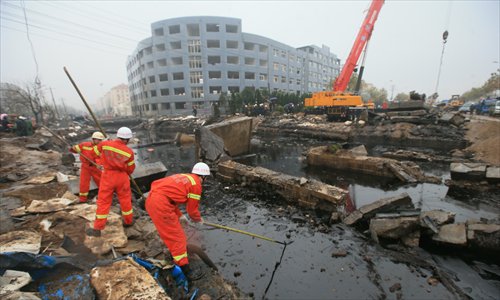Sinopec denies slow response to Qingdao oil blasts

Firefighters search for bodies near the site of explosions caused by oil leaks in Qingdao, Shandong Province on Sunday. The death toll rose to 52 since the blasts tore open several kilometers of roads from underground.Photo: CFP
Sinopec denied on Sunday that it was slow to respond and immediately reported to local authorities an oil leak in Qingdao, Shandong Province, which led to explosions that killed 52 people.
"We called the police and firefighters the first time we detected the oil leak," Lü Dapeng, spokesperson of Sinopec, told the Global Times on Sunday.
The possibility that the remaining oil and gas will cause subsequent blasts has been ruled out by intensive monitoring, Lü said.
Two blasts occurred at around 10:30 am on Friday when workers were repairing the ruptured section of the Dongying-Huangdao oil pipeline.
Song Xue, a media officer of the rescue headquarters set up by the local government after the incident, said answers were not available as to why the authorities failed to evacuate residents on receiving reports of a leak.
Some 130 injured people are being treated in hospitals and 11 people are still missing as of press time.
Crude oil began leaking from an underground pipeline at about 3 am on Friday in the Huangdao district of Qingdao.
The leaked oil then flowed into the city's rainwater pipe system, which empties into Jiaozhou Bay in the Yellow Sea.
An initial investigation showed that the explosions occurred after the crude oil leaked from the pipeline into the municipal pipe network. Sinopec said it was the water drainage pipe exploding, not the oil pipe.
The cause of the explosions remains unclear.
People have been questioning why nearby residents were not informed about the leaks and evacuated during the seven hours after the leak was spotted.
Residents said that they saw black liquid floating on the ground and smelt the odor of oil on Friday morning, the Beijing Youth Daily reported, noting that many did not know they were living above oil pipelines.
Sinopec admited in a report dated August 2012 that since the Dongying-Huangdao line, where the leak occurred, was finished in 1986, parts of rural areas along the line became crowded and other buildings were too close, hampering maintenance efforts.
Sinopec's board chairman Fu Chengyu made an apology on Saturday, saying that he feels greatly grieved to see the huge losses of life and property, and apologized to the people of Qingdao and the nation.
President Xi Jinping on Sunday visited people injured in the two explosions, urging local authorities to learn from this tragedy and beef up safety measures to avoid similar tragedies from happening.
Xi also urged authorities to speed up the investigation into the cause of the incident and hold responsible parties accountable.
A total of 18,000 people have been evacuated from the district, while local authorities are doling out food and water for residents affected by the blasts, cleaning up the remaining oil in the pipelines and repairing municipal pipelines involving water, electricity, gas and drainage, the Xinhua News Agency reported on Sunday.
Lü said that barricades had been set up that prevented the leaked oil spreading to the sea, noting that the remaining substance floating on the sea is mainly thin oil film, which is under control due to the favorable wind direction.
Workers in charge of cleaning the spills told the China News Service Sunday that it would take a month to completely eliminate the spills.